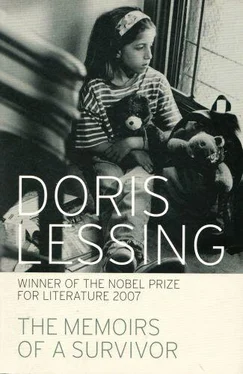She was with them now every day from early afternoon until midnight and after; and I and the animal would be sitting behind the curtains, peering out at the dark, for there was only the one street lamp, and nothing much could be seen of the crowd milling about out there, except the pallor of faces, little gleams and flashes as cigarettes were lit, nothing heard of their talking together until they laughed, or sang for a while, or when voices rose wildly in a quarrel — and at such times I could feel Hugo trembling and shrinking. But quarrels were soon quelled by general consent, a communal veto.
And when we knew Emily was coming back, both of us, Hugo and myself, would quickly leave our post and go to where
we could be believed to be asleep, or at least not spying on her.
Throughout this period, whenever I was drawn in through the flowers and leaves submerged under half-transparent white paint, I found rooms disordered or damaged. I never saw who or what did it, or even caught a glimpse of the agent. It was seeming to me more and more that in inheriting this extension of my ordinary life, I had been handed, again, a task. Which I was not able to carry through. For no matter how I swept, picked up and replaced overturned chairs, tables, objects; scrubbed floors and rubbed down walls, whenever I re-entered the rooms after a spell away in my real life all had to be done again. It was like what one reads of a poltergeist's tricks. Already my entrance into that place was with a lowered vitality, a sense of foreboding, instead of the lively and loving anticipation I had felt on first being able to move there… I really do have to make it clear here that this feeling of discouragement was not at all like the misery that accompanied the 'personal' scenes; no, even at the worst, the disorder and anarchy of the rooms were nothing like as bad as the shut-in stuffiness of the family, the 'personal'; it was always a liberation to step away from my 'real' life into this other place, so full of possibilities, of alternatives. When I talk of 'lowering' here, I mean only in terms of the generally freer air of this region; I could not compare it with the constrictions and confinements of the place, or the time, where that family lived out its little puppet play.
But what laws, or needs, did the unknown destroyer obey? I would find myself in the long but irregular passage, like a wide hallway that extended itself indefinitely full of doors and little enclaves where a table might stand with flowers or a statue, pictures, objects of all kinds, each with an exact place — and open a door on a room next to it and there everything would be awry. A violent wind would be blowing the curtains straight out into the room, knocking over small tables, sweeping books off the arms of chairs, littering the carpet with ash and cigarette stubs from an ashtray which was wheeling there, ready to topple. Opening another door, everything stood as it ought: there was order, a room not only ready for its occupants, as neat as a hotel bedroom, but one which he, she, they, had just left, for I could feel a personality or presences in a room seen through a half-open door. Which, entering, perhaps only a moment later, I might find in chaos, as if it were a room in a doll's house, and the hand of the little girl had been inserted through the ceiling and knocked everything over on a freak of impulse or bad temper.
I decided that what I had to do was to repaint the rooms… I talk as if they were a permanent, recognisable, stable set of rooms, as in a house or a flat, instead of a place which changed each time I saw it. First, paint: what was the use of tidying, or cleaning furniture that would have to stand between such forlorn and shabby walls? I found paints. Tins of different sizes and colours stood waiting on spread newspapers on the floor in one of the rooms that was temporarily empty — I had seen it furnished only a few minutes before. There were brushes and bottles of turpentine and the painter's ladder I had seen during one of my early visits here. I started on a room I knew well: it was the drawing-room that had brocade curtains and pink and green silks and old wood. I stacked what was usable in the middle of the room under dust-sheets. I scrubbed down the ceiling and walls with sugar soap, with hot water, with detergents. Layer after layer of white paint went on, first dull and flat, then increasingly fine, until the last one covered everything with a clear softly shining enamel, white as new snow or fine china. It was like standing inside a cleaned-out eggshell; I felt that accretions of grime had been taken off which had been preventing a living thing from breathing. I left the furniture there in the centre of the room under its shrouds, for it seemed too shabby now for such a fine room, and I felt that there seemed little point in setting it out: when I returned the poltergeist would have flung everything about or thrown muck at the walls. But no, it was not so, this did not happen; or I think it did not — for I never saw that room again. And it was not that I looked for it and failed to find it… would it be accurate to say that I forgot it? That would be to talk of that place in terms of our ordinary living. While I was in that room, the task made sense; there was continuity to what I did, a future, and I was in a continuing relation to the invisible destructive creature, or force, just as I was with the other beneficent presence. But this feeling of relatedness, of connection, of context, belonged to that particular visit to the room, and on the next visit it was not the same room, and my preoccupation with it was altered — and so with the other rooms, other scenes, whose flavours and scents held total authenticity for the time they lasted and not a moment longer.
I have been writing, with no particular reluctance or lack of enjoyment, descriptions of the realm of anarchy, of change, of impermanence; now I must return to the 'personal' and it is with dismay, a not-wanting…
I had approached a door, apprehensive, but also curious to see if I would open it on the poltergeist's work, but instead it was a scene of clean tidiness, a room that oppressed and discouraged because of its statement that here everything had its place and its time, that nothing could change or move out of its order.
The walls were ruthless; the furniture heavy, polished, shining; sofas and chairs were like large people making conversation; the legs of a great table bruised the carpet.
There were people. Real people, not forces, or presences. Dominant among them was a woman, one I had seen before, knew well. She was tall, large, with a clean-china healthiness, all blue eyes, pink cheeks, and the jolly no-nonsense mouth of a schoolgirl. Her hair was brown and there was a great deal of it piled on the top of her head and firmly held there. She was dressed for company; she wore good clothes, expensive, fashionable, and inside them her body seemed to be trying to assert it self — timidly, but with a certain courage, even gallantry. Her arms and legs looked uncomfortable; she had not wanted to put on these clothes, but had felt she must: she would discard them with a small laugh, a sigh, and 'Thank the Lord for that, what a relief!'
She was talking to a woman, the visitor, whose back was to me. I could watch her face, her eyes. Those eyes, unclouded by self-criticism, like skies that have been blue for too many weeks, and will continue blue and regular for weeks yet, for it is nowhere near the time for the season to change — her eyes were blank, did not see the woman she was talking to, nor the small child in her lap, whom she bumped up and down energetically, using her heel as a spring. Nor did she see the little girl who stood a short way from her mother, watching, listening, all her senses stretched, as if every pore took in information in the form of warnings, threats, messages of dislike. From this child emanated strong waves of painful emotion. It was guilt. She was condemned. And, as I recognised this emotion and the group of people there in the heavy comfortable room, the scene formalised itself like a Victorian problem picture or a photograph from an old fashioned play. Over it was written in emphatic script: GUILT.
Читать дальше
Конец ознакомительного отрывка
Купить книгу












